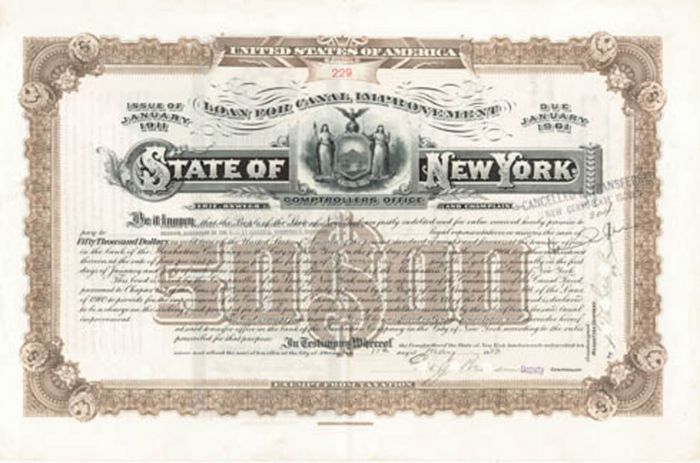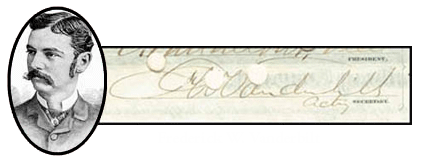Frederick W. Vanderbilt signed 1920's dated Autograph Railroad Bond
Inv# AG1009 Bond

STATE OF NEW YORK. Bond signed by Frederick W. Vanderbilt for the 'Canal Improvement of the State of New York'. Issued to the estate of Alfred G. Vanderbilt. Sadly, it is interesting to note that Alfred G. died in the sinking of the Lusitania.
Frederick William Vanderbilt (February 2, 1856 – June 29, 1938) was a prominent member of the American Vanderbilt family. He served as a director of the New York Central Railroad for 61 years and also held directorships at the Pittsburgh and Lake Erie Railroad as well as the Chicago and North Western Railroad. Upon graduating from Yale, he joined his father at the New York Central Railroad, following in the footsteps of his brothers, and worked across various departments to acquire a comprehensive understanding of the railroad industry. After many years of service in the railroad sector, he shifted his focus to travel and yachting. Vanderbilt was a director of 22 railroads, which included the New York Central Railroad, the Pittsburgh and Lake Erie Railroad, and the Chicago and North Western Railroad.
Frederick Vanderbilt passed away in Hyde Park, New York, on June 29, 1938. He was interred at the Vanderbilt Family Cemetery and Mausoleum in New Dorp. At the time of his death, his estate was valued at $79,845,478 (equivalent to $1,706,922,900 today). He bequeathed $5,200,000 to the Sheffield Scientific School, $3,900,000 to Vanderbilt University, $1,300,000 to the Salvation Army, and $650,000 to the New York Association for Improving the Condition of the Poor. Following his charitable contributions, his niece, Mrs. Margaret Louise Van Alen (1876–1969), became the primary heir to his estate, inheriting his 5th Avenue residence, his Hyde Park home, and 25% of the remaining estate.
A bond is a document of title for a loan. Bonds are issued, not only by businesses, but also by national, state or city governments, or other public bodies, or sometimes by individuals. Bonds are a loan to the company or other body. They are normally repayable within a stated period of time. Bonds earn interest at a fixed rate, which must usually be paid by the undertaking regardless of its financial results. A bondholder is a creditor of the undertaking.











Ebay ID: labarre_galleries